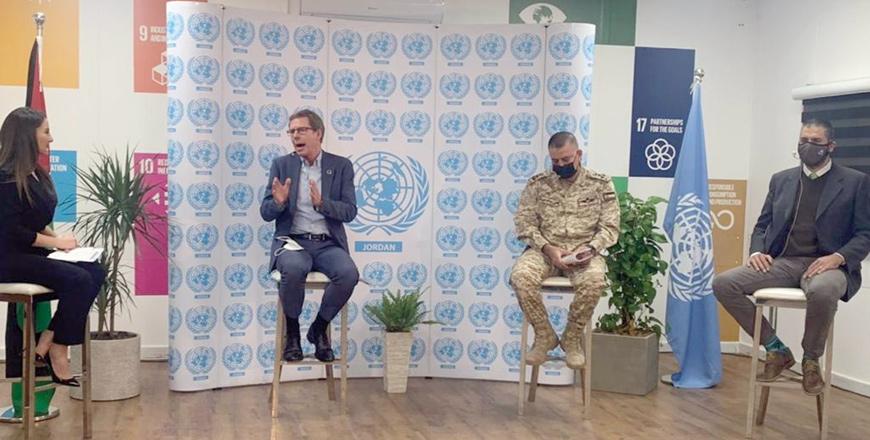- Local News
- Web-2021-03-03 | 05:03 pm

As a year has passed since the first COVID-19 case was recorded in the Kingdom, the decisions that were implemented in the anti-virus fight and their socio-economic impact took centre stage at a talk organised by the UN on Monday.
The UN Talk titled "Putting People First: Response to COVID-19” was organised under the United Nations Socio-Economic Framework to Respond to COVID-19 in Jordan.
"If it was not for the way the Jordanian government responded to the pandemic, with the support of all of us as members of the international community, things would have been much worse. We have learnt a lot from the past year and we are looking forward to 2021 to see how we can manage the impact that is going to be with us for some time in the future,” UN Resident and Humanitarian Coordinator in Jordan Anders Pedersen said.
A three-tiered approach was developed from the onset of the outbreak, the first of which was the immediate response to the health crisis. The second tier was keeping life-sustaining assistance to refugees, and the third, the current stage, is dealing with the impact of the pandemic beyond its health dimensions, Pedersen explained, noting that the pandemic has exposed the vulnerabilities of societies all over the world and at the same time stressing UN’s keenness on "leaving no one behind”.
The key for Jordan’s success in dealing with this pandemic is mainly its ability to balance between economic, social and health aspects, Brig. Gen Mazen Faraiah, Deputy Head of the National Centre for Security and Crisis Management, said.
"It was very difficult to maintain a balance, and the situation was new. We did not have, and still do not, the full picture of the pandemic, and we still don’t know how long will it be there,” Faraiah added.
Faraiah explained that ability to strengthen the health sector was another key factor in dealing with the pandemic successfully, in addition to involving the National Centre for Security and Crises Management to ensure that institutions from all sectors work together effectively.
Faraiah noted the great role that the Jordanian people have played, demonstrating cooperation with governmental measures, and making great sacrifices along the way, at the same time he observed that "a full lockdown now would be very costly”.
"We want the people to come forward and register to take vaccine, and discard unfounded rumors about the vaccination. We also need to be patient as the whole world is trying to overcome this pandemic,” he said.
Saverio Bellizzi, Emergency Team Lead at the WHO, noted that when it comes to the pandemic, WHO supported the response to the pandemic at the global, regional and state levels.
The relationship between WHO and the Ministry of Health in Jordan was "excellent” from the onset of the pandemic, which "allowed us to be on board in supporting the country, and this is ongoing” , Bellizzi said.
Bellizzi commented on the new COVID strains, confirming that they are more transmissible which explains some of the rapid increases in the number of cases.
Wael Hayajneh, Ministry of Health Secretary General for Epidemiological Affairs highlighted
"We have managed to at least quadruple our hospital capacities. Our regular beds for COVID-19 in the beginning were about 700-800, now they are 4000 beds. This is a very important investment,” Wael Hayajneh, Ministry of Health Secretary General for Epidemiological Affairs explained.
According to Hayajneh, another big investment that Jordan has made has been developing laboratory and testing capacities. Whereas in the beginning PCR testing did not exceed 2000 per day, today it exceeded 40,000.
"I can confidently say that in the last three months, we hired at least 2,200 employees for the Health Ministry. Thanks to the international community, we were able to train these employees and give them the right skills to treat patients,” Hayajneh added.
The official stressed the importance of continued commitment to the preventive measures, despite the availability of the vaccines.
Hayajneh highlighted that everybody residing in Jordan has the right to take the vaccine, noting that individuals from 135 nationalities received the vaccine in Jordan.
Chinara Aidyralieva, public health coordinator at the WHO, said that vaccines bring hope of the pandemic eventually being controlled
"Vaccinations are extremely safe. There are very few side effects, which is inevitable for any vaccine. There are four vaccines in Jordan all of which have been approved to be safe,” Aidyralieva said.
Nevertheless, Aidyralieva warned that it cannot be guaranteed that every person who receives the vaccine would develop full immunity, which is why the idea of a vaccination passport still does not have much support, Aidyralieva added.









